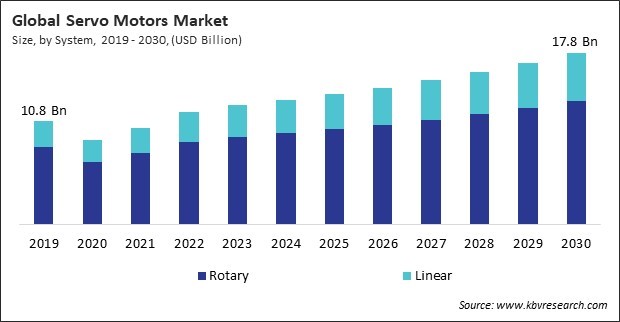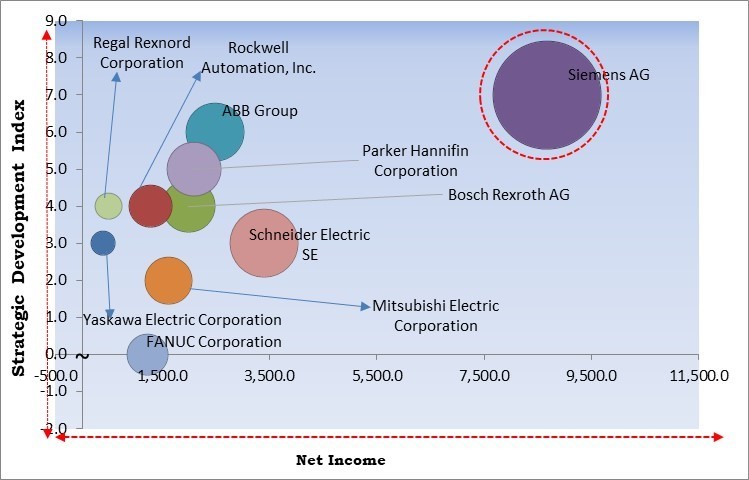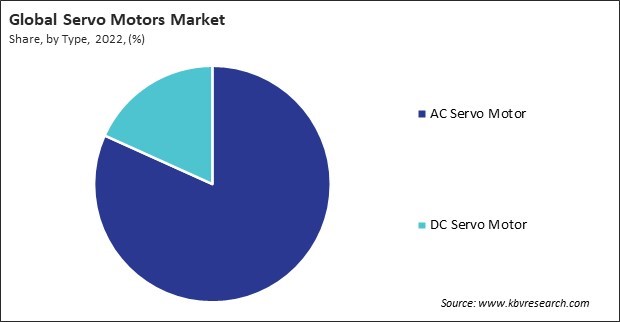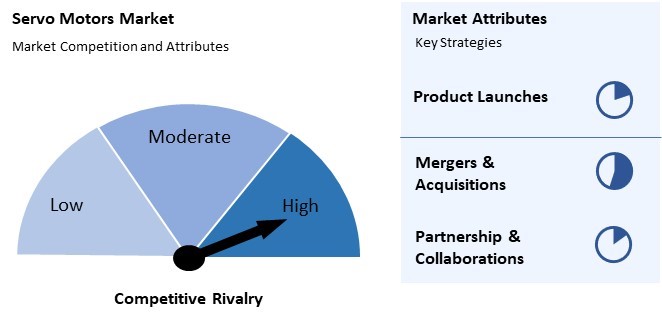“Global Servo Motors Market to reach a market value of USD 17.8 Billion by 2030 growing at a CAGR of 5.3%”
The Global Servo Motors Market size is expected to reach $17.8 billion by 2030, rising at a market growth of 5.3% CAGR during the forecast period.
Europe’s emphasis on Industry 4.0 principles, including digitalization, connectivity, and smart manufacturing, is accelerating the deployment of these motors in advanced automation systems. Consequently, the European region would acquire nearly, 21% of the total market share by 2030. Europe is at the forefront of industrial automation, with a robust ecosystem of manufacturers, integrators, and technology providers driving innovation and adoption of servo motor solutions.

The major strategies followed by the market participants are Acquisitions as the key developmental strategy to keep pace with the changing demands of end users. For instance, in February, 2024, ABB signed an agreement to acquire SEAM Group. This acquisition enhances ABB's Electrification Service offering with expertise in predictive maintenance, electrical safety, renewables, and asset management advisory services. Moreover, in October, 2023, Rockwell Automation took over Clearpath Robotics, a Canadia robotics company. This positions Rockwell as a leader in end-to-end production logistics solutions.
Based on the Analysis presented in the KBV Cardinal matrix; Siemens AG is the forerunners in the Market. In July, 2023, Siemens acquired the EV division of Mass-Tech Controls Private Limited, a Mumbai-based company specializing in AC and DC chargers for electric vehicles (EVs). The acquisition aimed at enhancing Siemens' e-mobility portfolio to meet the growing demand in India's evolving EV market. Companies such as Schneider Electric SE, ABB Group and Parker Hannifin Corporation are some of the key innovators in Market.

Advances in servo motor controller technology have led to developing more powerful and precise controllers. Moreover, these motors are increasingly equipped with communication protocols that facilitate seamless integration with other components of Industry 4.0 systems. Hence, these aspects will drive the demand in the market.
Industrial automation solutions, driven by these motors, significantly enhance production efficiency by automating repetitive tasks, reducing cycle times, and minimizing errors. Additionally, these motors provide precise positioning, speed control, and torque regulation capabilities, improving product quality and consistency. Hence, owing to these factors, there will be increased demand for these motors.
A substantial initial investment is needed to acquire, install, and integrate servo motor systems. This financial barrier can be particularly daunting for small and medium-sized enterprises (SMEs) or companies with constrained capital budgets, hindering their ability to adopt servo motor technology. Moreover, SMEs may face difficulty securing financing or loans to fund servo motor projects, as financial institutions may perceive such investments as high-risk or require stringent collateral or credit requirements. Thus, these factors can decrease demand for these motors in the upcoming years.
On the basis of system, the market is divided into linear and rotary. In 2022, the linear segment witnessed a 27% revenue share in the market. Linear servo motors provide precise and accurate linear motion, making them ideal for applications requiring tight tolerances and positioning accuracy.
Based on type, the market is segmented into AC servo motor and DC servo motor. In 2022, the DC servo motor segment garnered an 18% revenue share in the market. DC servo motors are known for their high-performance capabilities, providing precise speed control, torque regulation, and dynamic responsiveness. With advancements in motor design, materials, and control algorithms, modern DC servo motors offer improved accuracy, speed, and stability, enabling superior motion control in diverse applications.

Based on application, the market is divided into robotics, machine tools, electronic devices, printing & packaging technologies, and others. In 2022, the machine tools segment witnessed a 28% revenue share in the market. Multi-axis machining has become increasingly prevalent in this segment, enabled by these motors capable of driving complex motion profiles and synchronized movements across multiple axes. By leveraging these motors for multi-axis control, machine tools can perform intricate operations such as simultaneous milling, turning, and drilling with unprecedented accuracy and efficiency. Thus, these aspects can fuel the demand in the segment.
Free Valuable Insights: Global Servo Motors Market size to reach USD 17.8 Billion by 2030
By region, the market is segmented into North America, Europe, Asia Pacific, and LAMEA. The Asia Pacific segment procured 37% revenue share in the market in 2022. The automotive and electronics industries are major consumers of these motors in the Asia Pacific region. With the rise of electric vehicles, smart manufacturing, and Industry 4.0 initiatives, there is a growing need for these motors in electric power steering systems, EV drivetrains, robotics, and automated assembly lines. Therefore, these aspects can lead to increased growth in the segment.

The Market is highly competitive due to industry growth, technological advancements, global presence, diverse applications, price competition, and meeting customer demands. This environment drives companies to innovate and improve continuously to stay competitive.
| Report Attribute | Details |
|---|---|
| Market size value in 2022 | USD 11.7 Billion |
| Market size forecast in 2030 | USD 17.8 Billion |
| Base Year | 2022 |
| Historical Period | 2019 to 2021 |
| Forecast Period | 2023 to 2030 |
| Revenue Growth Rate | CAGR of 5.3% from 2023 to 2030 |
| Number of Pages | 231 |
| Number of Tables | 353 |
| Report coverage | Market Trends, Revenue Estimation and Forecast, Segmentation Analysis, Regional and Country Breakdown, Competitive Landscape, Porter’s 5 Forces Analysis, Company Profiling, Companies Strategic Developments, SWOT Analysis, Winning Imperatives |
| Segments covered | System, Type, Application, Region |
| Country scope |
|
| Companies Included | Siemens AG, ABB Group, Yaskawa Electric Corporation, Rockwell Automation, Inc., FANUC Corporation, Mitsubishi Electric Corporation, Parker Hannifin Corporation, Schneider Electric SE, Bosch Rexroth AG (Robert Bosch GmbH) and Regal Rexnord Corporation |
By System
By Type
By Application
By Geography
The Market size is projected to reach USD $17.8 billion by 2030.
Rising demand for industrial automation are driving the Market in coming years, however, Concerns about high initial investment costs restraints the growth of the Market.
Siemens AG, ABB Group, Yaskawa Electric Corporation, Rockwell Automation, Inc., FANUC Corporation, Mitsubishi Electric Corporation, Parker Hannifin Corporation, Schneider Electric SE, Bosch Rexroth AG (Robert Bosch GmbH) and Regal Rexnord Corporation
The expected CAGR of this Market is 5.3% from 2023 to 2030.
The AC Servo Motor segment led the Market by Type in 2022; thereby, achieving a market value of $14.3 Billion by 2030.
The Asia Pacific region dominated the Market by Region in 2022, and would continue to be a dominant market till 2030; thereby, achieving a market value of $7 Billion by 2030.
Our team of dedicated experts can provide you with attractive expansion opportunities for your business.

 Drivers
Drivers
 Restraints
Restraints
 Opportunities
Opportunities
 Challenges
Challenges
